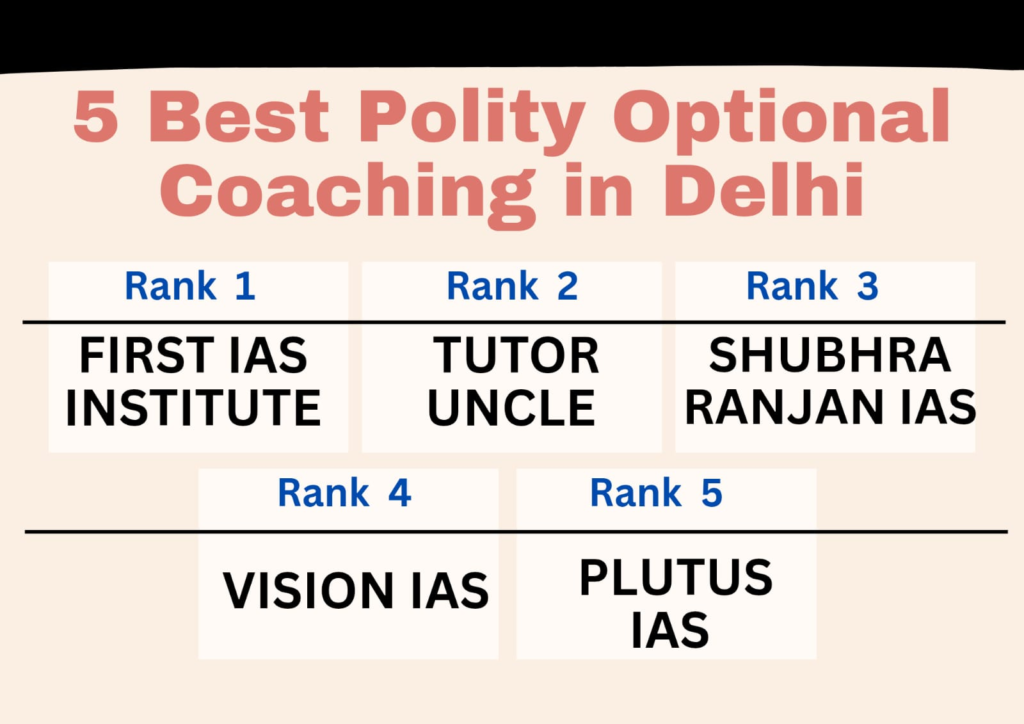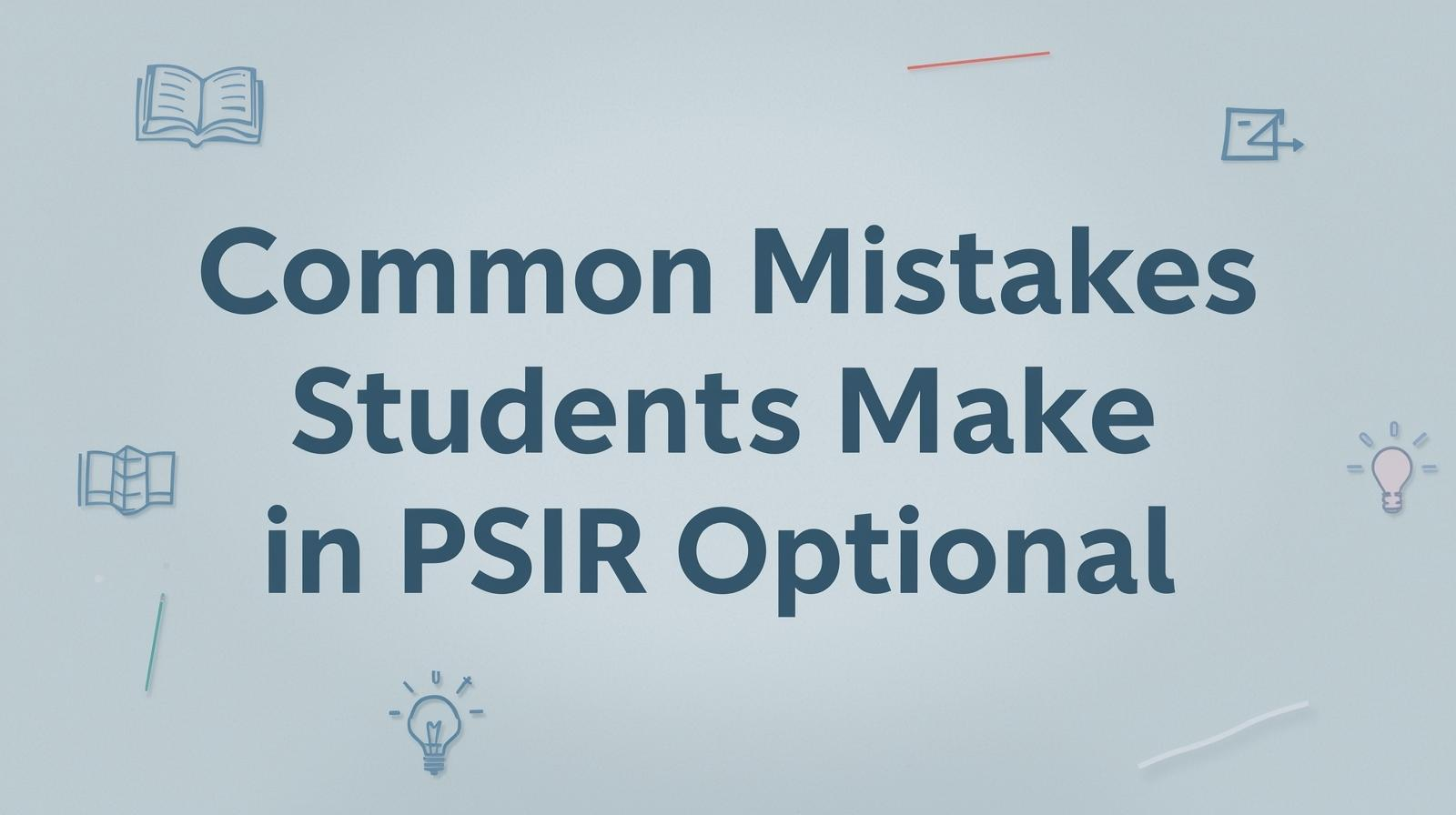Political Science and International Relations (PSIR) is an optional subject that holds immense promise for UPSC Civil Services aspirants. Its significant overlap with the General Studies papers, its dynamic nature, and its potential for high scores make it a compelling choice. Yet, every year, a large number of students who opt for PSIR find themselves with marks that are far below their expectations. This discrepancy often arises not from a lack of hard work, but from a series of common, repeated mistakes made during the preparation and execution phases.
Identifying these pitfalls is the first and most crucial step toward rectifying them. A strategic and aware aspirant is one who learns from the mistakes of others rather than repeating them. This guide aims to provide a diagnostic overview of the most frequent errors students make in their PSIR optional journey and offers clear, actionable solutions to navigate around them.
Free Demo Class for PSIR Optional By – FIRST IAS INSTITUTE
Foundational and Strategic Errors
The most serious mistakes are often made at the very beginning of the preparation cycle. These foundational errors can derail the entire process, leading to a weak conceptual base and misdirected efforts.
Mistake 1: Underestimating Paper 1, Section A (Political Theory)
One of the most pervasive errors is the neglect of the political theory section. Faced with thinkers from Plato to Rawls, many students find this part of the syllabus too abstract, dense, or disconnected from the “real” questions of Indian politics and international relations. They tend to give it a cursory reading, preferring to jump directly to the more seemingly tangible topics in Paper 1B and Paper 2.
The Consequence: This is a catastrophic strategic blunder. Political theory is not just one section of the syllabus; it is the very bedrock upon which the entire discipline of Political Science is built. The concepts of Justice, Liberty, Equality, Sovereignty, Power, and Rights are the analytical tools you need to dissect any issue in the subsequent sections. Without a firm grasp of these theories, your answers in Indian Politics and International Relations will be descriptive and superficial. You will be able to state what happened, but you will not be able to explain why it happened from a political science perspective.
The Solution: Begin your PSIR preparation with Political Theory. Treat it as the foundation of your knowledge structure. Do not rush through it. Spend quality time understanding the core arguments of each thinker. Create concise notes that map the evolution of concepts like justice from Plato’s ideal state to Rawls’ theory of fairness. More importantly, actively practice applying these theories. When you read about an affirmative action policy in the newspaper, analyze it through the lens of Dworkin’s equality of resources or the debate on group rights. This approach will not only strengthen your Paper 1A but will also add unparalleled depth to your answers across all four sections of the optional.
Mistake 2: Treating the Syllabus as Disconnected Silos
Aspirants often study the syllabus in a linear, fragmented manner. They study Paper 1A, then 1B, then 2A, and finally 2B, treating them as four separate subjects. They fail to build bridges between the sections, viewing the Constitution as separate from political philosophy, and foreign policy as separate from international relations theory.
The Consequence: This siloed approach prevents the development of a holistic, integrated understanding, which is the hallmark of a high-scoring candidate. An answer on the challenges to Indian federalism that does not draw upon theories of the state or sovereignty is incomplete. An analysis of the India-US relationship that does not engage with the theoretical debates between realism and liberalism is shallow. The examiner is looking for a political scientist, not a student who has memorized four different modules.
The Solution: Make interlinkage a conscious and continuous exercise. When studying the Preamble of the Indian Constitution (Paper 1B), explicitly connect its ideals of justice, liberty, and equality back to the Western political thinkers you studied in Paper 1A. When analyzing a foreign policy decision (Paper 2B), frame your answer using the theoretical constructs of power, national interest, or complex interdependence from Paper 2A. A practical way to do this is to maintain a separate “Interlinkage Notebook” or use mind maps to visually connect concepts across different parts of the syllabus.
Also Read: 5 Best Polity Optional Coaching in Delhi
Mistake 3: Over-reliance on a Single Source or Coaching Material
In an attempt to simplify their preparation, many students become entirely dependent on a single source, typically a set of consolidated coaching notes or a single popular guidebook. They read this material cover to cover without ever consulting the standard academic textbooks for the subject.
The Consequence: While coaching materials can be useful for structuring your preparation, relying solely on them leads to generic, formulaic answers. Thousands of other candidates are writing the exact same points from the exact same source. Such answers lack originality, critical depth, and the scholarly flavor that examiners look for. They often present a simplified, and sometimes even incorrect, understanding of complex theories.
The Solution: Use coaching notes as a supplementary guide, not as your primary text. Your preparation must be anchored in standard academic books. Read Andrew Heywood for a nuanced understanding of global politics, O.P. Gauba for clarity in political theory, and Subrata Mukherjee & Sushila Ramaswamy for Western political thought. Reading these texts will help you develop your own understanding and formulate original arguments, which will make your answers stand out.
The Blunders in Answer Writing
Knowledge is necessary, but not sufficient. The final score is a reflection of how that knowledge is presented in the exam hall. Answer writing is where most aspirants falter, often committing errors that cost them dearly.
Mistake 4: Writing General Studies Answers in PSIR Papers
This is arguably the most common and the most fatal mistake. Due to the syllabus overlap, students often fail to differentiate between the demands of a GS answer and a PSIR answer. They apply the same GS framework—multidimensional points (social, political, economic), focus on government schemes, and a solution-oriented conclusion—to their optional papers.
The Consequence: This results in disastrously low marks. The examiner for your optional paper is a subject matter expert, likely a professor of Political Science. They are not looking for a generalist’s overview; they are expecting an academic discourse. A GS-style answer on “judicial activism” will list recent cases and constitutional articles. A PSIR answer must situate the debate within the larger context of separation of powers, discuss the tension between parliamentary sovereignty and constitutionalism, and quote scholars who have analyzed the phenomenon.
The Solution: Consciously practice writing in two different modes. Take a common topic like “Panchayati Raj” and write two separate answers: one for GS Paper 2 and one for PSIR Paper 1. The GS answer would focus on its functioning, challenges, and government initiatives. The PSIR answer would analyze it through the lens of democratic decentralization, grass-roots democracy, participation, and theories of power, quoting relevant thinkers and committee observations from a political science perspective. Internalizing this difference is non-negotiable for a high score.

Mistake 5: Name-dropping Thinkers without Context
Knowing that quoting scholars is important, many students resort to “name-dropping.” They pepper their answers with names like Aristotle, Kautilya, Morgenthau, and Foucault without explaining the specific idea or argument of the thinker that is relevant to the question.
The Consequence: This tactic is transparent to any experienced examiner. It looks superficial and demonstrates a lack of genuine understanding. Simply stating “As per Susan Okin…” adds no value. It is intellectual bluffing and can be counterproductive, as it highlights the candidate’s shallow knowledge.
The Solution: Focus on the argument, not just the name. Instead of name-dropping, integrate the scholar’s idea seamlessly into your own argument. For example, instead of saying “Foucault said power is everywhere,” you should write, “The subtle forms of social control can be understood through a Foucauldian lens, which posits that power is not merely a repressive tool of the state but is a productive force that operates throughout the social body.” This shows that you have not just memorized a name but have understood and can apply a concept.
Errors in Resource Management and Revision
How you manage your study materials and your revision strategy can make or break your performance.
Mistake 7: Reading Too Many Books (The Collector’s Fallacy)
In their quest for the “best” material, aspirants often fall into the trap of collecting a vast library of books, notes, and articles for every topic. They hear a recommendation from a topper and immediately add another book to their pile.
The Consequence: This leads to information overload and paralysis. With too many sources to cover, the student is unable to complete, let alone revise, any of them properly. Their knowledge remains wide but exceedingly shallow. They end up knowing a little about everything but nothing with the depth required for an optional paper.
The Solution: Be a minimalist. For each section of the syllabus, choose one, or at most two, standard textbooks and stick to them. Your goal is to master these core texts. It is infinitely more beneficial to revise one standard book like Andrew Heywood’s Global Politics five times than to read five different books on IR once. Supplement this core knowledge with your own notes and value additions from current affairs, not with more books.
Also Read: 5 Best Polity Optional Coaching in Delhi
Mistake 8: Ignoring Previous Years’ Questions (PYQs)
Many students, especially those new to the preparation, either completely ignore PYQs or only look at them superficially a few days before the exam. They prefer to invest their time in reading material or joining mock test series without first understanding what UPSC actually asks.
The Consequence: Their preparation lacks direction. They study topics that are rarely asked while neglecting high-frequency themes. They fail to grasp the specific language and directives used by UPSC in its questions. Mock tests, while useful, may not always accurately reflect the standard or pattern of the actual examination.
The Solution: PYQs should be your North Star. Start your preparation by thoroughly analyzing the questions from the last 10-15 years. This exercise will reveal the core and peripheral areas of the syllabus, the depth of knowledge required, and the nature of the questions asked. You should make it a point to create answer frameworks or write full-length answers for all the PYQs. This is the single most important exercise to align your preparation with the examiner’s expectations.
By consciously avoiding these common mistakes, you can navigate your PSIR preparation with greater clarity and confidence. Success in this optional is not just about accumulating knowledge; it is about building a deep conceptual understanding, developing a scholarly approach to answer writing, and following a smart, focused strategy. Awareness of these pitfalls is the first step to ensuring your hard work translates into a top-tier score.

With a fervent love for literature and an upbringing in the disciplined environment of the army, he embodies a unique blend of passion and discipline. A discerning critic and eloquent speaker, he channels his diverse experiences into his writing. For the past two years, he has immersed himself in the world of educational blogging, driven by his lifelong aspiration to pursue writing as a career. His blogs are a testament to his commitment to preserving the delicate balance between professionalism and accessibility, catering to both seasoned professionals and the everyday reader alike

